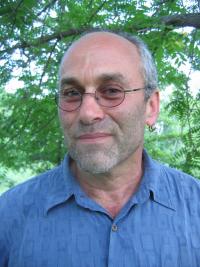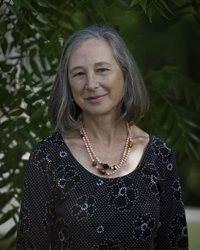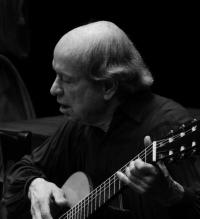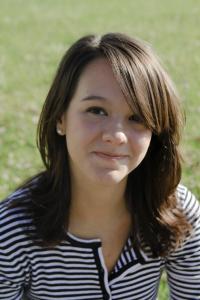Worthy of Note
 Marlboro congratulates photography professor John Willis for receiving a fellowship award from the John Simon Guggenheim Memorial Foundation in April. John is one of 180 scholars, artists and scientists chosen from almost 3,000 applicants across the country. His application included work from his 2010 book, Views from the Reservation (Potash Hill, Winter 2011), as well as his 2002 Recycled Realities (Potash Hill, Summer 2001), in addition to other endeavors. John plans to use the award to continue pursuing artistic projects that integrate his work at Marlboro with the youth programs he has helped establish, the In-Sight Photography Project in Brattleboro and the Exposures cross-cultural youth arts program.
Marlboro congratulates photography professor John Willis for receiving a fellowship award from the John Simon Guggenheim Memorial Foundation in April. John is one of 180 scholars, artists and scientists chosen from almost 3,000 applicants across the country. His application included work from his 2010 book, Views from the Reservation (Potash Hill, Winter 2011), as well as his 2002 Recycled Realities (Potash Hill, Summer 2001), in addition to other endeavors. John plans to use the award to continue pursuing artistic projects that integrate his work at Marlboro with the youth programs he has helped establish, the In-Sight Photography Project in Brattleboro and the Exposures cross-cultural youth arts program.
Recently retired (but never slowing down) biology professor Bob Engel taught a class in ornithology this spring at the Osher Lifelong Learning Institute, a continuing education program for seniors in Brattleboro. Also featured this spring was anthropology professor Carol Hendrickson, discussing indigenous peoples of Latin America in the 21st century. These Marlboro faculty members continue a long tradition of sharing their scholarship with elder community members at Osher, including in recent years William Edelglass, Lynette Rummel, Amer Latif, Meg Mott and Geri Pittman de Batlle.
“I explore functional forms that reflect industrial traditions, seeking to make work that may be, in some way, indicative of the eminence of the owner,” writes ceramics professor Martina Lantin in an article in the March/April 2011 issue of Pottery Making Illustrated. Titled “A Crowning Achievement,” the article describes Martina’s inspiration and technique for creating “crown jars,” original designs that combine functionality with decorative qualities reminiscent of Wedgwood and other status-symbol ceramics of the early industrial era. “My crown jars are equally capable of holding the collected bounty of a batch of cookies or the ideas and aspirations of its owner.”
 Anyone who has attended staff-faculty readings at the college has been delighted to learn that Marlboro’s president, Ellen McCulloch-Lovell, is also an accomplished poet. Last winter marked the publication of a fine book of poems by Ellen, Gone, in a limited edition from the acclaimed art book publisher Janus Press. Gone is illustrated with a lithograph by Janus founder Claire Van Vliet and includes 21 of Ellen’s poems printed on handmade paper from a mill in Maidstone, England.
Anyone who has attended staff-faculty readings at the college has been delighted to learn that Marlboro’s president, Ellen McCulloch-Lovell, is also an accomplished poet. Last winter marked the publication of a fine book of poems by Ellen, Gone, in a limited edition from the acclaimed art book publisher Janus Press. Gone is illustrated with a lithograph by Janus founder Claire Van Vliet and includes 21 of Ellen’s poems printed on handmade paper from a mill in Maidstone, England.
“Where else is a nuclear disaster in the world’s only A-bombed country more potent than in the world’s first A-bombed city?” asked Andrew Tanabe ’12, reporting from his World Studies Program internship in Hiroshima, Japan. He was working at the Hiroshima Peace Culture Foundation, doing research and translation as well as helping to create a model “Peace Culture” that includes a clean energy economy and local food systems. In the wake of the nuclear disaster in northeast Japan, he was surprised to learn that Japanese citizens do not often connect nuclear weapons with nuclear power. “Interestingly, I think this sentiment is particularly strong in Hiroshima,” Andrew said.
“As a research tool, and a way to make some friends, I have been learning my way around a root of ginger, a clove of garlic, a spoon, a wok and some fatty pork,” said World Studies Program student Zack Chilcote ’13. He is spending a year in Beijing, teaching English at a Montessori school and researching the social impacts of China’s “one child” policy. He hopes that the school will provide guanxi (connections) for his research, but he’s finding the quickest way to meet people is to cook for them. “Research gives me the ability to say something that perhaps other people have not thought of before, and then actually explore it until it becomes real to me.”
Brenda Foley, theater professor and director of the World Studies Program, presented a paper in May at an interdisciplinary meeting in Warsaw called “Probing the Boundaries, Making Sense of Pain.” In the paper, which combines theory from the fields of disability and performance studies, Brenda explores how performance can be used to disrupt a socially constructed public image of disability that denies the reality of visible pain. “Culturally we perpetuate a hierarchy of disability according to visible difference,” she said. “We like our disabilities to be neat and tidy, not messy, sloppy, ugly or contorted in pain. But the potential exists in performance to blur that societal inscription.”
 Not everyone celebrates their birthday with a terzetto from Mozart’s Magic Flute and a fountain of molten chocolate. But then, not everyone is retired language professor Edmund Brelsford. In March the venerable Marlboro Recorder Workshop, founded by Edmund, celebrated its 47th-anniversary concert season and Edmund’s 80th with a concert in Ragle Hall. The ensemble presented vocal and instrumental music of the Middle Ages, the Renaissance and the baroque and classical periods. Their concert paid homage to the late Blanche Honegger Moyse, as well as to retiring Marlboro colleague Luis Batlle, and was followed by a reception with cake and, yes, molten chocolate for dipping strawberries.
Not everyone celebrates their birthday with a terzetto from Mozart’s Magic Flute and a fountain of molten chocolate. But then, not everyone is retired language professor Edmund Brelsford. In March the venerable Marlboro Recorder Workshop, founded by Edmund, celebrated its 47th-anniversary concert season and Edmund’s 80th with a concert in Ragle Hall. The ensemble presented vocal and instrumental music of the Middle Ages, the Renaissance and the baroque and classical periods. Their concert paid homage to the late Blanche Honegger Moyse, as well as to retiring Marlboro colleague Luis Batlle, and was followed by a reception with cake and, yes, molten chocolate for dipping strawberries.
Those who read the last issue of Potash Hill (Winter 2011) will remember Sari Brown’s ’11 field research on gender and religion in Bolivia. This spring, Sari returned to Bolivia with anthropology professor Carol Hendrickson, supported by an Aron Grant, to look beyond discursive methods of documenting life in and around La Paz. They created artwork, recorded street sounds, took series of photos in stop-motion style and brought back food and garments from Bolivia’s rich material culture. “It was really interesting for me to go back and try to be conscientious about taking things in on a more bodily, sensorial level and looking for nondiscursive forms of meaning and communicating,” said Sari.
 During winter break, Emily Mente ’11 joined students from across the country for a week of workshops and meetings in New York City called Feminist Winter Term. Initiated by Soapbox Inc., the program brings young feminists together to broaden their horizons and show them what kinds of jobs are available with a gender studies degree. “It really gave us an idea of what the feminist landscape of New York City looks like,” said Emily, who even tagged along with one of the organizers for a meeting with Gloria Steinem. “I was so star-struck,” she said.
During winter break, Emily Mente ’11 joined students from across the country for a week of workshops and meetings in New York City called Feminist Winter Term. Initiated by Soapbox Inc., the program brings young feminists together to broaden their horizons and show them what kinds of jobs are available with a gender studies degree. “It really gave us an idea of what the feminist landscape of New York City looks like,” said Emily, who even tagged along with one of the organizers for a meeting with Gloria Steinem. “I was so star-struck,” she said.
Philosophy professor William Edelglass writes, “It seems to be a natural development in all literate societies, and in many nonliterate societies as well, to ask difficult questions about the fundamental nature of reality, about what it is to be human, about what constitutes a good life, about the nature of beauty and about how we can know any of these things.” William and colleague Jay L. Garfield edited The Oxford Handbook of World Philosophy (ISBN 978-0-19-532899-8), published by Oxford this year, co-authoring the introduction and the chapter on Indo-Tibetan Buddhist philosophy. His recent publications also include a bibliographic essay on Buddhist philosophy for the Oxford Bibliographies Online.
 As if being dean of students and hosting a nationally syndicated radio show is not keeping him busy enough, Ken Schneck went ahead and got elected to the Brattleboro Town Selectboard with 59 percent of the vote in March. His goal, as always, is to invite as many voices to contribute to town discussions and decisions as possible. “Our town government has not yet embraced social media,” said Ken. “In fact, we’ve barely said hello to electronic media. I want to create different avenues of participation for Brattleboro citizens to be heard, diversifying the communication stream as much as possible. Also, bringing some levity to the process? Not such a bad thing.”
As if being dean of students and hosting a nationally syndicated radio show is not keeping him busy enough, Ken Schneck went ahead and got elected to the Brattleboro Town Selectboard with 59 percent of the vote in March. His goal, as always, is to invite as many voices to contribute to town discussions and decisions as possible. “Our town government has not yet embraced social media,” said Ken. “In fact, we’ve barely said hello to electronic media. I want to create different avenues of participation for Brattleboro citizens to be heard, diversifying the communication stream as much as possible. Also, bringing some levity to the process? Not such a bad thing.”
“I’m off getting some fresh, new stories and insights to enliven my African Politics course this fall,” Lynette Rummel wrote from her adventures in Mali, where she spent three weeks of spring sabbatical. Lynette plans to use Mali as a case study country, to explore and examine the more general trends and patterns that she presents in class. “I’ve never been to Mali before, so it will make it new and exciting to reconsider common arguments and larger contours in a new and different light. For example, I wonder if many Americans are aware of our involvement in this country as a front against, you guessed it, al Qaida in the Maghreb.”
Apparently not one to sit still for long, art professor Felicity Ratté spent her 2010–11 sabbatical year studying Islamic art and architecture around the Mediterranean region. Starting last August, Felicity explored Spain, Morocco, Tunisia, Egypt, Syria, Iraq, Turkey and Bulgaria, finally ending her travels in Venice. She photographed vaulted domes and minarets from Kairouan to Kurdistan in an effort to better understand how medieval city-dwellers used their urban landscape. “Now I need to sit down and make some sense out of it all,” Felicity said, but again, sitting is not her strength. In May she presented preliminary findings in a conference paper titled “The celebrated city in the Mediterranean: possibilities for comparison between Florence and Cairo, c. 1300,” in Corfu.
Be sure to get the latest scoop on Potash Hill at these sites:
- Potash Phil
- YouTube
